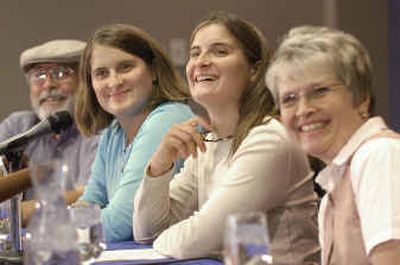Giving up ‘unacceptable’ for survivor

BILLINGS – Jodee Hogg had survived the plane crash and one cold night on top of a mountain. She feared if she and her injured companion didn’t start hiking, neither of them would survive a second night.
“I had a feeling that it was absolutely unacceptable for me to sit down and quit,” Hogg said Wednesday, recounting her ordeal last month as she and Matthew Ramige hiked out of Montana’s rugged Great Bear-Bob Marshall Wilderness Area. “I was perfectly capable of walking, and I had walked a lot further than that in my life before.”
Hogg, 23, and Ramige, 30, had been given up for dead, along with three other people aboard the small plane, when it crashed Sept. 20 while the group was on its way into the backcountry to fix telecommunications equipment and conduct a vegetation survey.
Despite Hogg’s sprained foot and back and Ramige’s broken back and severe burns, the two hiked down the mountain and to a highway where they eventually flagged down motorists for help. The distance they traveled was not far – probably three to five miles – but with the rough terrain and their injuries, it took them 29 hours.
With her twin sister and parents beside her, Hogg on Wednesday recalled how she and Ramige struggled to make their way off the mountain, convinced that they could not wait for rescue on the mountain if they wanted to survive.
In all, five people were on the plane – the pilot and four U.S. Forest Service workers. Ramige, Hogg and Ken Good survived the crash and fire, though Good soon died of his injuries.
The National Transportation Safety Board is still investigating the crash. Ramige remains hospitalized in Seattle.
Hogg recounted for reporters Wednesday the unexpected and jarring crash, hitting her back and thinking: “That’s gonna hurt.” She said the plane was on fire by the time it came to a stop on the mountain and she quickly undid her seat belt to escape.
“The fire in the plane was really intense,” she said. Within minutes, it was engulfed. “It doesn’t seem like it took very long.”
Ramige and Good also made it out of the plane. Both had suffered more severe injuries than Hogg. She managed to build a box-like shelter from scattered plane parts. Good’s injuries were too severe.
By morning, Hogg said, she knew she and Ramige had to start moving.
“It was probably the longest night I’ve ever had in my life,” she said. “We kept our spirits up. We talked a lot, slept a bit. Then morning came, and it was just another day I had to take a walk in the woods, so we did.”
Hogg said she could see generally which direction they needed to go, but the going was hard – there were rocks and logs and it was easy to fall down.
They walked a bit, then rested, then set out again, Hogg said. Through much of the trek, Hogg said she was simply on “autopilot.”
A number of times, Hogg said she and Ramige saw planes overhead and waved; they stumbled across a trail and yelled. On their second night together, they had managed to get to lower elevation, but it was still cold. They hunkered down in an area where trees provided some shelter and slept on a bed of leaves.
Hogg said the whole time, she stayed focused on reaching help.
When they finally made it to a highway, she said they encountered three vehicles, all of which stopped, including a Forest Service green truck.
Some seemed to be confused by what she told them.
“I’m from the 206,” she said, referring to the model of Cessna plane that had crashed. “I was in the plane crash. I need to go to the hospital, my friend needs a helicopter right now.”
Hogg, who was using a cane Wednesday, said she’s still recovering emotionally and physically.
During her ordeal, Hogg said she drew strength from her family and friends.
She mentioned specifically her twin, Kyna, who said she had the “worst day of my life and best day of my life back to back.”
“As for right now,” Kyna Hogg said, “everything’s getting better every day.”